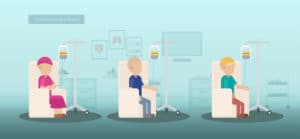Cachexia patients in Maryland can qualify for access to a medical marijuana card, which allows them to purchase medical marijuana from dispensaries within the state.
It also lets them purchase the plant to treat their medical condition. In Maryland, cachexia patients can qualify for MMJ or medical marijuana since the state lists cachexia as a qualifying condition for this type of treatment.

However, this is not so visible in obese people who have lost a lot of weight. Because of muscle and skeletal loss, cachexia patients are also unable to move around, such that even holding a conversation may cause them to experience fatigue.
Appetite loss and anorexia can also happen as patients with this condition often don’t have the desire to eat. With medical marijuana, these symptoms can be reduced.
To gain access to an MMJ card, TeleLeafRX Maryland can help with your application.
Patients with cachexia can qualify for medical marijuana. Since cachexia is a “wasting” disorder that causes extreme involuntary weight loss, cannabis is a valid solution.
Medical marijuana (also called medical cannabis) is believed to help increase their ability to intake food by allowing patients to manage vomiting and nausea.
If you’re looking to utilize medical marijuana as a treatment option for cachexia, visit our MD page to apply for a medical marijuana card.
As of 2021:
Cachexia is defined as a “wasting” disorder that results in extreme weight loss, including body fat, as well as muscle wasting. It is often associated with cancer due to the high percentage of late-stage cancer patients that can be affected by and die from this condition.
It also affects people with late stages of HIV, COPD, AIDS, congestive heart failure, and kidney disease.
Cachexia is a complicated disease, which makes it difficult to recognize. Thus, a variety of criteria are used for diagnosis. One common criterion used in diagnosing cachexia is if a person involuntarily loses more than 5% of their body weight over a six to twelve-month period.
Another is having a body mass index (BMI) of less than 20 in a person below 65 years old or having a BMI of less than 22 in those over 65 years.
Because it’s a complex syndrome, the causes of cachexia may often vary depending on your underlying illness and physiology. Some consistent factors seen across different diagnoses include the following:
The diminished quality of life experienced by cachexia patients is most apparent in their deteriorating physical appearance. Not only does this physically affect patients, but it also emotionally affects their loved ones as their declining strength may serve as a visual reminder that treatment may be extremely difficult to achieve or even impossible in some cases.
There’s no one way to treat cachexia since it’s associated with various underlying diseases. 
Residents of Maryland who are suffering from cachexia are allowed to use medical marijuana provided they are registered with the Maryland Medical Cannabis Commission.
Contact us or visit TeleLeaf RX to know more about the process of getting a medical marijuana card in MD.
